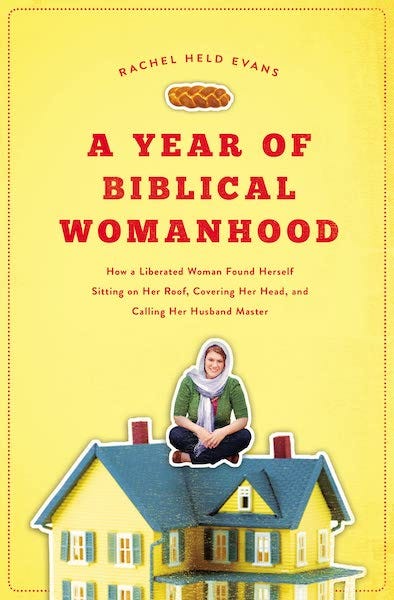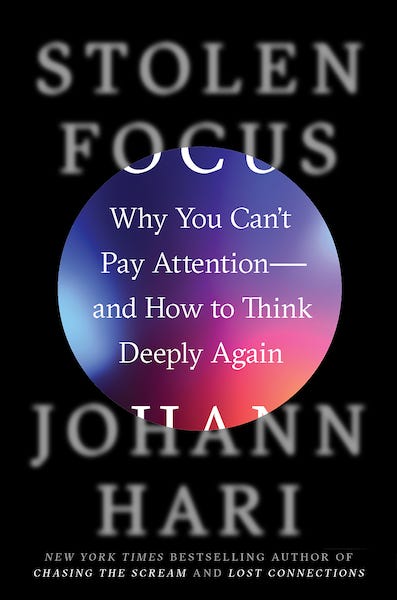📚 What to Read Next (No. 215): Grace to All
Happy Friday, readers!
The news remains heavy, doesn’t it? Today while scrolling my New York Times app, there were headlines about Ukraine, the Sackler family denying blame in the opioid crisis while settling out of court for billions, a possible criminal case involving our 45th president, etc.
One of the (many) insidious results of a social network-connected world is that every tragedy and item of bad news feels so much closer to home and so much more ingrained in our day-to-day consciousness. Everything has an impact on our energy and emotions—a phenomenon that didn’t exist even a decade ago.
That particular problem is addressed is Johann Hari’s new Stolen Focus, which I feature below. Oliver Burkeman also tackled the sticky issue in his fantastic newsletter this morning, particularly in regards to not being able to work very effectively:
“If you wait . . . for all the existential threats to pass, all the desperate human suffering to subside, you'll be waiting forever.
So don't wait. Not just because marinating in the news helps no-one, but because what you'll be doing instead — meaningful work, keeping your community functioning, being a good-enough parent or a decent friend — that stuff actively does help. There's something you're here to do. And I highly doubt that it's doomscrolling.
For now, I’ll leave you with this: No matter where you’re at—geographically, mentally, emotionally—take care of yourself and those around you.
(I spied and stole that sentiment from a coworker in one of our Slack channels today. Thank you, Krista!)
Anyways, one of the things I love about Hari’s new book is how much grace he gives the average smartphone user. Whereas a lot of modern books about the deleterious effects of technology put a lot of blame on the user (rather than Big Tech), Hari puts the onus elsewhere and encourages baby steps towards reclaiming your attention and sanity.
In a surprisingly similar regard, Rachel Held Evans beautifully writes about gender and Christianity in her book A Year of Biblical Womanhood. It’s a topic that’s generally loaded with judgment, so Evans’ book was a breath of fresh air.
Let’s jump in.
A Year of Biblical Womanhood by Rachel Held Evans
Published: 2012 | Pages: 308
“I guess we’re all a little afraid that if God’s presence is there, it cannot be here.”
Let’s start at the end: I read the final, stunning chapter through tears, knowing how Rachel’s story ultimately ended. The Christian world was shocked in the spring of 2019 when Rachel passed away suddenly from flu complications. She left behind a husband and two young children—and an incredible legacy of re-shaping the Christian conversation on gender, politics, and evangelicalism.
A Year of Biblical Womanhood wasn’t her first book, but it was the one that put her on the map. The premise is hard to stay away from: For one year, Rachel not only immersed herself into exploring the idea of “Biblical womanhood,” but sought to live out some of the more radical ideas, one month at a time.
Some of those experiments felt a little gimmicky—I mean, duh, that was sorta the point. But, Rachel’s careful, graceful diagnosis and handling of where American Christianity has gone awry serves to overcome any possible shortcoming.
Evans is always honest, but never judgmental:
“We cling to the letter because the spirit is so much harder to master.”
This book hits differently now, in 2022, than it would have when originally published in 2012. In part, it’s because I think Rachel’s quest to redefine “Biblical womanhood” worked. The conclusions aren’t quite as eye-opening, because she helped redefine the conversation about gender roles in Christianity—she brought a big dose of grace to the table, where there was none before.
I’ll leave you with my single favorite passage from the book:
“When we turn the Bible into an adjective and stick it in front of another loaded word (like manhood, womanhood, politics, economics, marriage, and even equality), we tend to ignore or downplay the parts of the Bible that don't fit our tastes. In an attempt to simplify, we try to force the Bible's cacophony of voices into a single tone, to turn a complicated and at times troubling holy text into a list of bullet points we can put in a manifesto or creed. More often than not, we end up more committed to what we want the Bible to say than what it actually says. . . .
Are we reading with the prejudice of love or are we reading with the prejudices of judgment and power, self-interest and greed?”
Stolen Focus: Why You Can't Pay Attention—And How to Think Deeply Again by Johann Hari
Published: 2022 | Pages: 286
This book isn’t perfect. Let me say that upfront. Because what I’m going to say next may seem like hyperbole: Stolen Focus has the potential to change your life.
I’ve read a lot of books about attention, smartphones, and the detriments of social media. For some reason, this is a book that hit home more than any of the others.
The real strength of Stolen Focus is the first half, in which Hari absolutely skewers Big Tech (Google, Facebook/Instagram, and others). The apps you spend time on, especially social networks, make money when your app is open and lose money when your app is closed. It’s that simple. You are the product, and every single action you take within those apps is tracked and sold to advertisers.
And the worst part? These networks are engineered, from start to finish, to steal your attention from everywhere else and to spend more and more time on that network.
There’s a reason you get angry every time you open Twitter; there’s a reason you feel a bit jealous—like you aren’t doing quite enough with your life—every time you open Instagram. It’s 100% on purpose.
The second half of the book wanders into some far-out, unexpected places, and it’s gotten some criticism for not offering practical solutions (a critique I mostly disagree with), but I flew through its pages regardless.
Though my own life situation—with a new job in tech and young kids—likely has a lot to do with it, Stolen Focus got me to quit Instagram, only use Twitter on my computer browser, and delete email from my phone. It’s been about two months since I did all that and it’s been soooo freeing.
Well, I’ve gone longer in the word count than I intended to, so I’ll close up shop with this quote from Tristan Harris: “You can try having self-control, but there are a thousand engineers on the other side of the screen working against you.”
Give this book a read. Consider going nuclear with your digital habits. Above all, give yourself grace no matter what those habits (and even compulsions) are.
If you don’t want to read the book, that’s just fine, but I definitely encourage you to listen to one of his handful of podcast interviews—just search “Johann Hari” in whichever podcast player you use.
Thanks so much for reading! I deeply appreciate the time and inbox space.
-Jeremy




Thanks for the recommendation of the Evans book. It's my practice to read religious/spiritual books during lenten season. I was looking for another book to add. When I say I am a "Focused ADD" reader this is what I mean. I just finished "Gone With the Wind" and my wife and I did our walk to the library. Just browsing I found a biography on Gen. Lee. Referenced in the book is Lew Wallace who served with Lee in Mexico and wrote Ben Hur. Reading about Wallace, a true polymath minus the math, and his research for this book I added it to my lent reading list. Just following Alice down the rabbit hole leads to treasures unknown.
Last year I went "Marie Kondo" on my Facebook profile, unfriending or unfollowing people who I really didn't like, know, or brought no joy to my feed. I figured out how to manipulate the algorithms to provide more attractive ads to ignore. So doomscrolling hasn't been an issue but time has. Last week I reinstated the 15 minute limit and, going with Burkeman, it's amazing how freeing it is to celebrate finitude! Just that simple alert that I've been in for 15 minutes has not inky reduced the time I spend on the darn app but also how much I even desire to use FB.